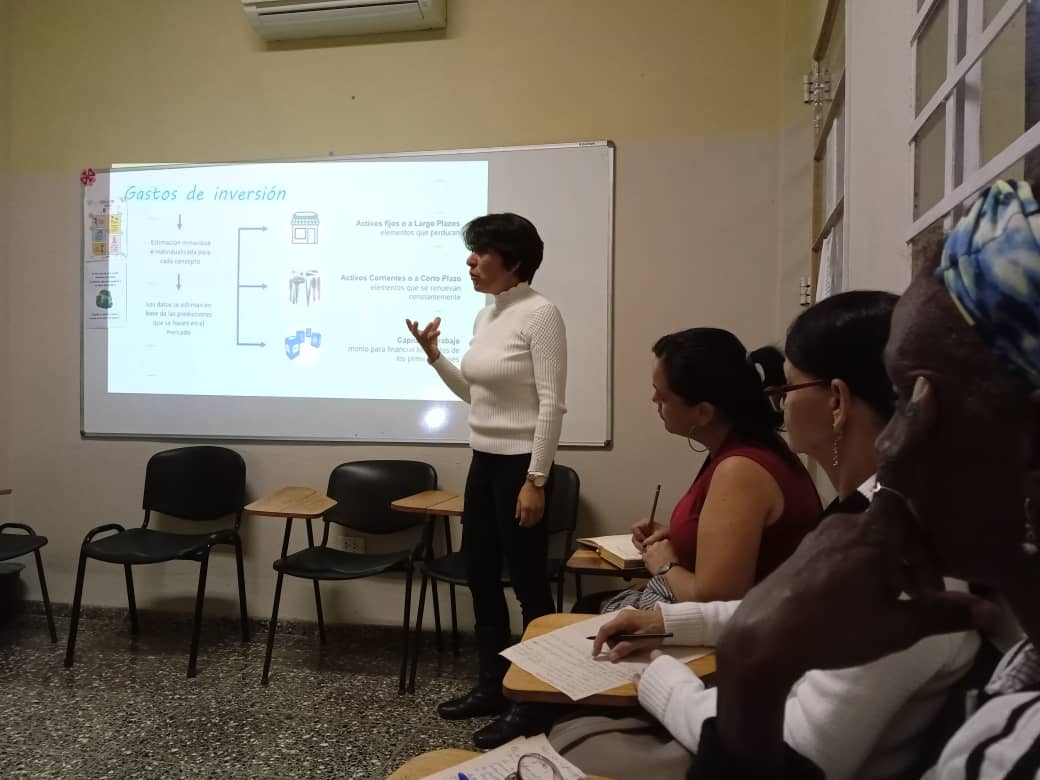As inflation continues to impact the global economy, Cuba has seen an exacerbated economic decline which has had a devastating effect on the most vulnerable populations on the island. Amid this challenging environment, the Loyola Centers are offering courses that are aimed at helping community members start new businesses and promote a community of mutual support.
Thanks to the support of Magis Americas, this program is having a positive impact which continues to expand as more community members get involved. The Loyola Centers’ entrepreneurial workshops give participants the formation necessary to convert talents or hobbies they may have into operable business ventures.
 Ernesto, one of the participants from the Loyola Center – San Miguel del Padrón, touched on this very point in his testimony saying, “starting from a hobby and manual skills I was able to, little by little, give shape to that idea until it became the economically profitable project that I am currently developing.” The continuing education and support found at the centers also helps new entrepreneurs innovate and grow their businesses.
Ernesto, one of the participants from the Loyola Center – San Miguel del Padrón, touched on this very point in his testimony saying, “starting from a hobby and manual skills I was able to, little by little, give shape to that idea until it became the economically profitable project that I am currently developing.” The continuing education and support found at the centers also helps new entrepreneurs innovate and grow their businesses.
Ernesto shared his vision for his next step as an entrepreneur saying, “in order to maintain and develop the business, we are trying to expand and diversify production, and to this end we are investing in tools that allow us to achieve greater efficiency and quality.”
Second, the Loyola Centers organize artisan fairs in which the members of the community who participate in the workshop can share their products and publicize their businesses.
Ninette, who participated in an expo-fair and the entrepreneurial workshops, shared with us, “in my case I was in the entrepreneurship workshop, as I was able to learn more about how to run my own business. Although I worked at home as a manicurist, in the workshops I was motivated to participate in the expo fairs promoted at the Loyola Center.”
 The sense of community that these workshops provide helps to motivate and reassure community members as they navigate the difficult economic environment. “The partnerships we have been able to establish are another of the benefits obtained from the workshop and the Center’s fairs,” Ernesto explains. As one example he shared that, “the wooden articles made in my business are very versatile, which has allowed us to link up with other craftsmen and women. We are currently making wooden boxes for another business that sells ornamental plants and wooden displays for a store that sells a variety of handicrafts.”
The sense of community that these workshops provide helps to motivate and reassure community members as they navigate the difficult economic environment. “The partnerships we have been able to establish are another of the benefits obtained from the workshop and the Center’s fairs,” Ernesto explains. As one example he shared that, “the wooden articles made in my business are very versatile, which has allowed us to link up with other craftsmen and women. We are currently making wooden boxes for another business that sells ornamental plants and wooden displays for a store that sells a variety of handicrafts.”
Finally, perhaps the most encouraging example of this community of entrepreneurs is their desire to give back to the community that helped impulse their own growth. Ernesto shared his experience saying, “After my participation in the project I continued my training in the exciting world of entrepreneurship and currently I work as a collaborator of the Center, and I teach the entrepreneurship workshop to share and help other people in the community who, like me, have a business idea and need tools to enable its implementation.”
Similarly, Ninette has also transitioned from student to teacher in the manicure and pedicure course at the Loyola Center. She told us, “I love this job and I like to collaborate in this project, since it allows many people to develop in this occupation and in other activities, as is the case of many young women and mothers without any work ties.”

